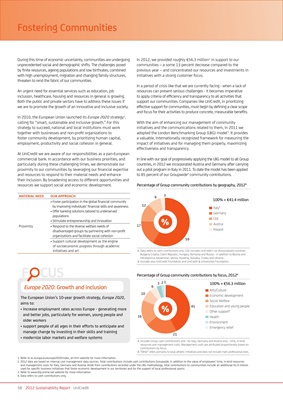
Fostering Communities
During this time of economic uncertainty, communities are undergoing In 2012, we provided roughly €56.3 million2 in support to our
unprecedented social and demographic shifts. The challenges posed communities – a some 13 percent decrease compared to the
by finite resources, ageing populations and low birthrates, combined previous year – and concentrated our resources and investments in
with high unemployment, migration and changing family structures, initiatives with a strong customer focus.
threaten to rend the fabric of our communities.
In a period of crisis like that we are currently facing - when a lack of
An urgent need for essential services such as education, job resources can present serious challenges - it becomes imperative
inclusion, healthcare, housing and resources in general is growing. to apply criteria of efficiency and transparency to all activities that
Both the public and private sectors have to address these issues if support our communities. Companies like UniCredit, in prioritizing
we are to promote the growth of an innovative and inclusive society. effective support for communities, must begin by defining a clear scope
and focus for their activities to produce concrete, measurable benefits.
In 2010, the European Union launched its Europe 2020 strategy1,
calling for “smart, sustainable and inclusive growth.” For this With the aim of enhancing our management of community
strategy to succeed, national and local institutions must work initiatives and the communications related to them, in 2011 we
together with businesses and non-profit organizations to adopted the London Benchmarking Group (LBG) model3. It provides
foster community development, by prioritizing human capital, a valuable, internationally recognized framework for measuring the
employment, productivity and social cohesion in general. impact of initiatives and for managing them properly, maximizing
effectiveness and transparency.
At UniCredit we are aware of our responsibilities as a pan-European
commercial bank. In accordance with our business priorities, and In line with our goal of progressively applying the LBG model to all Group
particularly during these challenging times, we demonstrate our countries, in 2012 we incorporated Austria and Germany after carrying
proximity to our communities by leveraging our financial expertise out a pilot program in Italy in 2011. To date the model has been applied
and resources to respond to their material needs and enhance to 85 percent of our Groupwide4 community contributions.
their inclusion. By broadening access to different opportunities and
resources we support social and economic development. Percentage of Group community contributions by geography, 2012A
MATERIAL NEED OUR APPROACH 9 3
• Foster participation in the global financial community 100% = €41.4 million
by improving individuals’ financial skills and awareness 12
ItalyB
• Offer banking solutions tailored to underserved
Germany
populations
%
CEE
• Stimulate entrepreneurship and innovation
17 Austria
Proximity • Respond to the diverse welfare needs of
disadvantaged groups by partnering with non-profit Poland
organizations and facilitate social cohesion
59
• Support cultural development as the engine
of socioeconomic progress through academic
initiatives and art A. Data refers to cash contributions only. CEE includes UniCredit’s six divisionalized countries -
Bulgaria Croatia, Czech Republic, Hungary, Romania and Russia - in addition to Bosnia and
Herzegovina, Kazakhstan, Serbia, Slovenia, Slovakia, Turkey and Ukraine.
B. Includes also UniCredit Foundation and UniCredit & Universities Foundation.
F CUS Percentage of Group community contributions by focus, 2012A
3 21 100% = €56.3 million
Europe 2020: Growth and inclusion 6
Arts/Culture
10 Economic development
The European Union’s 10-year growth strategy, Europe 2020,
Social Welfare
aims to:
• increase employment rates across Europe - generating more
and better jobs, particularly for women, young people and
% 41 Education and young people
Other supportB
16 Health
older workers Environment
• support people of all ages in their efforts to anticipate and Emergency relief
manage change by investing in their skills and training
21
• modernize labor markets and welfare systems
A. Includes Group cash contributions and - for Italy, Germany and Austria only - time, in-kind
resources and management costs. Management costs are attributed proportionally based on
contributions by focus.
B. “Other” refers primarily to local athletic initiatives and does not include main professional ones.
1. Refer to ec.europa.eu/europe2020/index_en.htm website for more information.
2. 2012 data are based on internal cost management data sources. Total contributions include cash contributions Groupwide, in addition to the value of employees’ time, in-kind resources
and management costs for Italy, Germany and Austria. Aside from contributions recorded under the LBG methodology, total contributions to communities include an additional €1.9 million
used for specific business initiatives that foster economic development in our territories and for the support of local professional sports.
3. Refer to www.lbg-online.net website for more information.
4. Data refers to cash contributions only.
58 2012 Sustainability Report · UniCredit